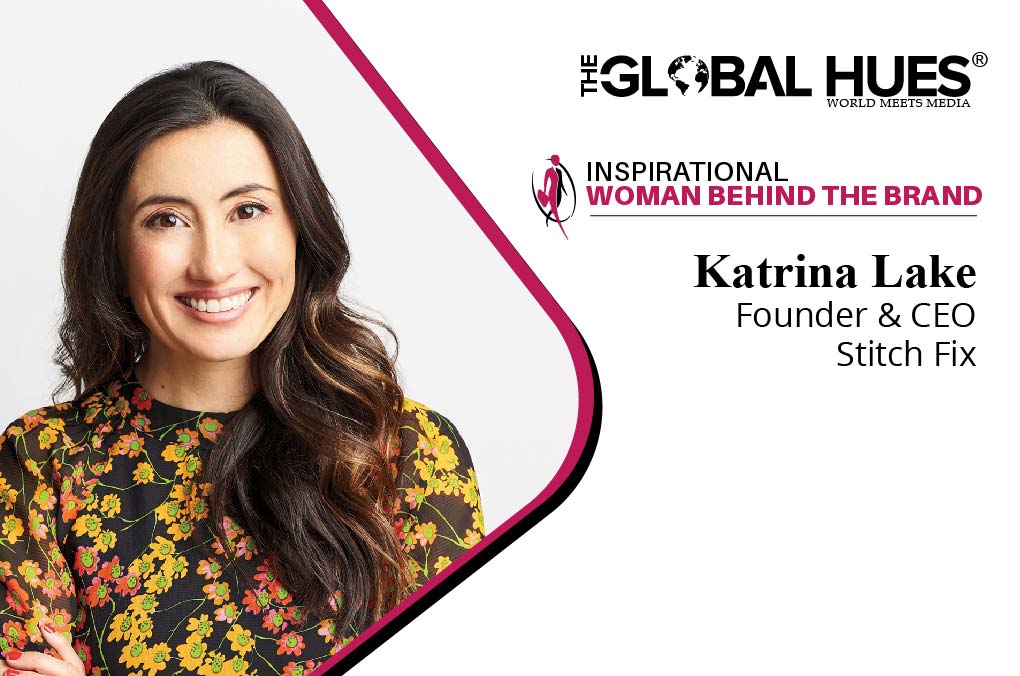“There just aren’t enough great examples of different types of people that are at the top. I feel a lot of responsibility in making sure that others can see themselves there, and not just a lot of men in suits.” – Katrina Lake (Founder & CEO, Stitch Fix)
Katrina Lake is the founder and CEO of Stitch Fix, one of the leading online personal styling services that curate stylish suitable clothing for clients based on their choices in the United States and the United Kingdom—more than 4.1 million of them. When Katrina Lake came with her toddler to the NASDAQ bell ringing in 2017, she reinvented the stereotypical CEO image created by society, something she’s been doing amazingly for her entire career. Instead of following the mainstream shopping pattern, StitchFix uses algorithms and the advice of expert stylists to pick out a box of clothes for you. Then you can try them on in the comfort of your own home, purchase the clothes you want to keep and return the rest at your convenience. Lake founded the company in 2011 when she was 28; in 2018 Stitch Fix made a whopping $1.2 billion, earning Lake a place on Forbes’s list of America’s Richest Self-Made Women. Katrina Lake resides in San Francisco along with her husband and two children. The idea came into her mind when she was in her Cambridge, Massachusetts, apartment in 2011, and six years later, at age 34, she became the youngest woman to take a company public.
Financial success is, clearly, key for the success of any company, but for Lake, running a lucrative business also means being a change-making leader. Diversity within her team and meaningful mentorship are the biggest leadership goals Katrina Lake aims at. Lake will transition from CEO to the role of executive chairperson of the board in August 2021, a seat change that will keep her close to her brand Stitch Fix and will also allow her to focus on the new passion project: Elevate. Stitch Fix does not just aim at earning more and more profits, Stitch Fix grant and mentorship programs uplift Black, Indigenous, and people of color (BIPOC) entrepreneurs with a $25,000 cash grant along with advisory support provided by the Stitch Fix team. The eight-month mentorship program already has six designers who were selected and their collections will be launched soon.
Lake had a mission to create a more diverse retail landscape by which she has driven a change in the apparel industry. She is talked about a lot on how she creates a strong impact, deals with rejection, and takes a hard pass on investors making deals over beers in a hot tub.

PC: HBS Digital Initiative
ABOUT HER BRAND – STITCH FIX
The business model of Stitch Fix is very simple and unique: the company sends you clothing and accessories they think you’ll like; you keep the items you want and send the others back. Stitch Fix utilizes data science to provide personalization at scale, cutting across traditional brick-and-mortar and e-commerce retail experiences. To have an expert stylist do the shopping for them and the convenience and simplicity offered by the service of Stitch Fix is what is appreciated the most by customers.
The largest challenge faced by the brand is making something seem simple and convenient to consumers while working profitably and at scale which is extensive. The fashion retail industry in today’s times is crowded, fickle, and rapidly changing which makes it difficult for brands to sustain. There are various other apparel retailers in the industry that try hard to differentiate themselves from others by offering the lowest price or the fastest shipping; Stitch Fix has made their brand to be unique for the customers through personalization. Each Fix shipment refers to a box containing five clothing and accessory items the company chooses just for you. The choices that are made are based on information that is received from the customer and millions of others —first in a detailed questionnaire that they fill out when they sign up, and then in the feedback that customers provide after each shipment.
Stitch Fix made sales of about $730 million worth of clothing in 2016 and about $977 million worth in the year 2017. One hundred percent of the revenue results of Stitch Fix are provided from the recommendations, which are the core of our business. Stitch Fix has more than 2 million active clients in the United States and carries more than 700 brands. In an interview, Stitch Fix explained their agenda,
“We’re not upselling you belts that match that blouse you just added to your cart or touting a certain brand because you’ve bought it before or using browsing patterns to intuit that you might be shopping for a little black dress—all activities that have low conversion rates. Instead, we make unique and personal selections by combining data and machine learning with expert human judgment.”
OBSTACLES AND CHALLENGES
Talking about the various fashion tech startups and e-commerce companies that have flooded the retail landscape in the past eight years or so, the personal styling service Stitch Fix has stood out as one of the fastest-growing and the first to go public startups, with a $120 million initial public offering in the recent year. The IPO could receive a huge lot of attention and coverage from the media across industries with journalists and analysts not only pointing to it as a potential model for other rapidly-growing fashion startups like Warby Parker but also mainly because of the dedication and hard work of the founder of the CEO Katrina Lake and also because it was ‘surprising’ because of her gender. Many stories have mentioned how hers was the only female-led tech IPO of 2017.
Tech has always been a very male-dominated industry. The recent statistics show that women own only a mere 5 percent of startups and hold only 11 percent of executive positions at Silicon Valley companies. Fashion has distressingly very few female CEOs. Katrina Lake has definitely fought well against the many obstacles she faced along the way but her success with Stitch Fix, as she tells it, was simply the result of intelligence, hard work, product/market fit, and also because of the right career moves and strategic education. Lake was well aware of the fact that she wanted to work at “the apparel retailer of the future” and took all the necessary steps she needed to get there — ultimately creating that retailer herself.
Stitch Fix, a subscription service through which customers receive boxes of clothing chosen by stylists particularly for them and pay for what they like while returning what they don’t, completely and truly represents the future of retail: It integrates data science, artificial intelligence, and human stylists for a business built around personalization. “How are people going to buy jeans 20 years from now?” Lake questioned herself early in her career. “I don’t think it’s going to be spending a half-day wandering around a bunch of stores at a mall. I don’t think it’s going to be sifting through a million pairs of jeans using filtering, sorting, ratings, and reviews in a traditional e-commerce setting.” Various things point to personalization being an overarching theme in retail for years to come, and Stitch Fix appears to be a few steps ahead of the game and also makes the brand innovative.
Katrina Lake has owned the field that people generally think is ‘male dominated’, she has become an inspiration for all women who think they can’t do it because this is what society makes them believe, Katrina’s story is all about believing in oneself.




